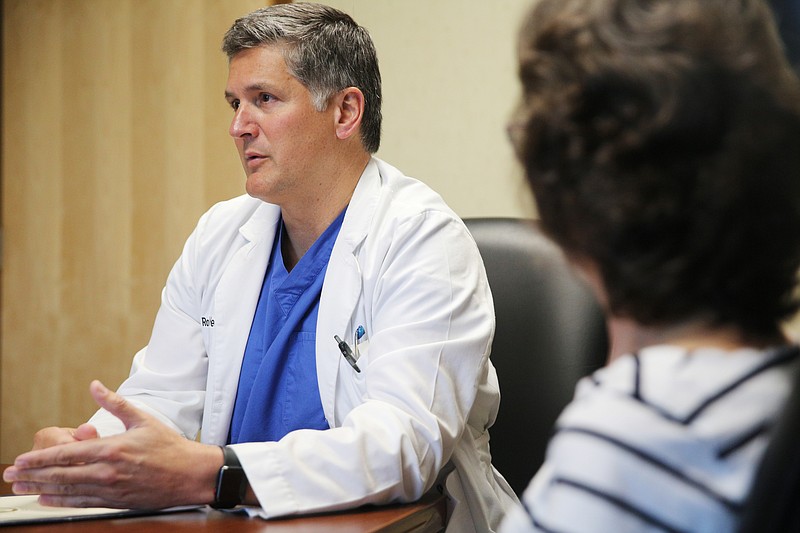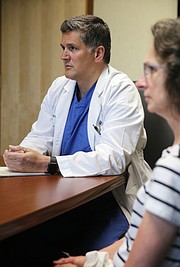Two weeks after having the lower lobe of her right lung removed, Mary Ketterer's cancer is gone, but a nagging cough, bouts of exhaustion and unanswered questions remain.
What started with a CT scan in April to check a troublesome kidney stone quickly escalated when the scan caught a suspicious mass toward the bottom of her lung. Additional tests revealed the tumor was cancerous, and Ketterer, a 61-year-old nurse who never smoked and prides herself on living a healthy, active lifestyle, was shocked.
"Everything was happening to me, and I was just totally surprised," she said. "I still don't understand, but it's true. It's me. It's happening to me, and now I'm having to deal with it and live with it."
Ketterer represents a growing number of female nonsmokers being diagnosed with lung cancer.
Dr. Keith Naunheim, president of the Society of Thoracic Surgeons and a general thoracic surgeon at St. Louis University Medical Center, said few women realize lung cancer, not breast cancer, is actually the No. 1 cancer killer of females in the U.S.
"While breast cancer occurs twice as often as lung cancer, the death rate for lung cancer is four times as high as that of breast cancer," Naunheim said. "The irony is that when lung cancer is detected early, it can be cured in three quarters of the patients."
For those reasons, Naunheim said early detection through a low-dose lung CT is key. However, only high-risk adults with a long history of smoking or environmental exposures are routinely screened, so most lung cancer in people like Ketterer is usually caught incidentally or in the late stages once symptoms arise, which is often too late.
About 20 percent of people who die from lung cancer each year in the U.S. never used tobacco, according to the American Cancer Society, and women are disproportionately affected - they make up two-thirds of nonsmokers who are diagnosed with lung cancer.
And while both lung cancer incidence and death rates have fallen as tobacco use declines and new treatment options emerge, women are seeing these rates decline at a slower pace than men.
Dr. Rob Headrick, chief of thoracic surgery at CHI Memorial and one of Ketterer's physicians, said the changing demographics of lung cancer is a crisis that needs attention.
"It's not just a smokers disease. In fact, what we're seeing now is it's becoming a woman's disease and a nonsmoking female disease - that's even more concerning, because they get blamed for smoking," Headrick said.
In May, research funded by the American Cancer Society and published in the New England Journal of Medicine propelled the issue into the spotlight.
The landmark study found the historical pattern of higher lung cancer rates among men had reversed among non-Hispanic white women and Hispanic women born since the mid-1960s, and the change was not fully explained by gender differences in smoking behaviors.
"What we don't know is why," Headrick said. "Why are women making up the predominance of nonsmoking lung cancers? Second, why now are women more likely to get lung cancer than men, and why is it occurring in white Caucasian women and Hispanic females?"
Headrick is on a quest to find the answers.
In June, he traveled to Washington, D.C., with a group from the Society of Thoracic Surgeons to lobby for a bill called the Women and Lung Cancer Research and Preventive Services Act. The bipartisan legislation would direct the U.S. Department of Health and Human Services to allocate existing research funds to study the issue.
"There's a lot of hypotheses, but those are educated guesses the logical pathway is tying a link between a genetic defect that may be more prevalent in the female population," he said. "How do you start advising women on the risk other than just scaring them? We want to get more to if you're in this age, if you're in this background, is there some type of blood test we can utilize? Are there some other type of genetic markers that can be developed to help profile these patients?"
Naunheim said there's "a crying need for lung cancer research," which Headrick said would help clarify some of these questions, better educate the public and ultimately save lives.
Despite the high death toll, lung cancer receives the least amount of funding per death from the National Institutes of Health when compared to the other major cancers affecting women, according to the Lung Cancer Alliance.
"These are solvable problems. It just takes focus, effort and dedication of research dollars," Headrick said.
He targeted senators and congressmen from Tennessee, Georgia and Alabama - states with high lung cancer rates whose constituents are heavily impacted by the disease - including Rep. Chuck Fleischmann, R-Tenn, a member of the congressional cancer caucus.
"The medical profession as a whole takes this upon themselves to come up and advocate for the maladies that they treat," Fleischmann said. "The best part about this is that these are not paid lobbyist, this a men and women who are dedicated professionals. It really is a labor of love."
Fleischmann's connection to cancer is personal. His mother who was otherwise in good health died from breast cancer when he was 13 years old.
He said even if the bill doesn't become a law, it's important from a messaging and awareness standpoint.
"The key will be to get it on the radar," he said.
Meanwhile, Ketterer is moving forward with her life. In the coming weeks, the cough should subside, her energy will return, and she'll get regular checkups to confirm the cancer's still at bay. But she worries about other women whose lung cancer is hidden.
"I would encourage women to take care of themselves and get regular checkups. Us women tend to put ourselves on hold I'm interested in seeing more research, too," she said. "I don't want to happen to somebody else what happened to me, but maybe not have a good outcome."
Contact staff writer Elizabeth Fite at efite@timesfreepress.com or 423-757-6673.

